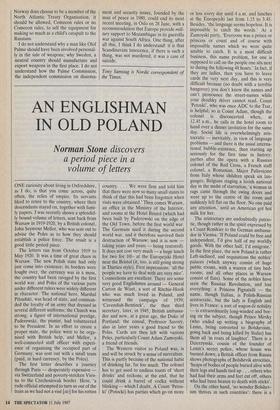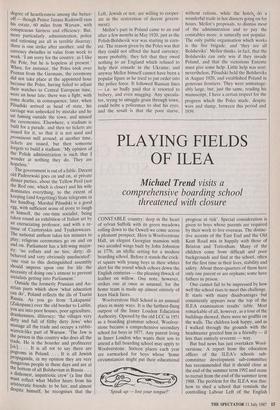AN ENGLISHMAN IN OLD POLAND
Norman Stone discovers
a period piece in a volume of letters
ONE curiosity about living in Oxfordshire, as I do, is that you come across, quite often, the relics of empire. Its servants liked to retire to the country, where their descendants stayed on, together with fami- ly papers. I was recently shown a splendid- ly bound volume of letters, sent back from Warsaw in 1919-1920, by a British colonel, John Seymour Mellor, who was sent out to advise the Poles as to how they should establish a police force. The result is a good little period piece.
The letters run from October 1919 to May 1920. It was a time of great chaos in Warsaw. The new Polish state had only just come into existence; its borders were fought over, the currency was in a mess, the country had been ravaged by the first world war, and Poles of the various parts under different rulers were widely different in character. The national hero, Marshal Pilsudski, was head of state, and comman- ded the loyalty of an army that dressed in several different uniforms; the Church was strong; a figure of international prestige, Paderewski, the pianist, had volunteered to be President. In an effort to create a proper state, the police were to be orga- nised with British help, and Mellor, a well-connected staff officer with experi- ence of organising the occupied part of Germany, was sent out with a small team (paid, in hard currency, by the Poles).
The first letter describes a journey through Paris -- desperately expensive — via Switzerland and poverty-stricken Vien- na to the Czechoslovak border. Here, 'a rude official attempted to turn us out of the train as we had not a vise [sic] for his rotten country. . . . We were firm and told him that there were now so Many small states to think of that this had been forgotten when vises were obtained.' Then comes Warsaw, an office in the Ministry of the Interior, and rooms at the Hotel Bristol (which had been built by Paderewski on the edge of the Old Town, before the first world war. The Germans used it during the second world war, and it therefore survived their destruction of Warsaw; and it is now — taking years and years — being restored). It does not cost very much — a huge lunch for two for 10/– at the Europejski Hotel near the Bristol (it, too, is still going strong in Thirties style). First impressions: 'all the people we have to deal with are very nice'. Connections are excellent. There are some very good Englishmen around — General Carton de Wiart, a sort of Ritchie-Hook who was much loved in Poland, and witnessed the campaign of 1939; 'Cavendish-Bentinck', the then third secretary, later, in 1945, British ambassa- dor and now, at a great age, the Duke of Portland; the consul, Professor Savory, also in later years a good friend to the Poles. Cards are then left with various Poles, particularly Count Adam Zamoyski, a friend of friends.
The Western visitor to Poland was, is and will be struck by a sense of surrealism. This is partly because of the national habit of drinking far, far too much. The colonel has to get used to endless toasts of 'short drinks' and reckons, at the end, that he could drink a barrel of vodka without blinking which I doubt. A Count Petos- ki' (Potocki) has parties which go on more or less every day until 4 a.m. and lunches at the Europejski last from 1.15 to 3.45.
Besides, 'the language seems hopeless. It is impossible to catch the words.' At a Zamoyski party, 'Everyone was a prince or princess or count and of course with impossible names which we were quite unable to catch. It is a most difficult business, this name problem, for one is supposed to call on the people one sits next to during the following 48 hours.' In fact, if they are ladies, then you have to leave cards the very next day, and this is very difficult because (no doubt with a terrible hangover) you don't know the names and can't pronounce the street-names while your drozhky driver cannot read. Count `Petoski', who was once ADC to the Tsar, is helpful; so is Count Adam, though the colonel is disconcerted when, at 12.45 a.m., he calls in the hotel room to hand over a dinner invitation for the same day. Social life is overwhelmingly aris- tocratic — inevitably, in view of language problems — and there is the usual interna- tional bubble-existence, then starting up seriously for the first time in history: parties after the opera with a Russian colonel of the Red Cross, a French staff colonel, a Romanian, Major Pallavicino from Italy whose children speak six lan- guages; Belgians staging a lavish national day in the midst of starvation; 'a woman in rags came through the swing doors and went up to the centre of the room and suddenly fell flat on the floor. No one paid any attention,' until an American got hot milk for her.
The aristocracy are undoubtedly patrio- tic, though rather in the spirit expressed by a Count Ronikier to the German ambassa- dor in Vienna: 'If Poland could be free and independent, I'd give half of my worldly goods. With the other half, I'd emigrate.' In the first place, the new Poland is rather Left-inclined, and requisitions the nobles' palaces (which anyway consist of huge public rooms, with a warren of tiny bed- rooms; and all other places in Warsaw consist of flats). Some of the nobles have seen the Russian Revolution, and lost everything: a Princess Pignatelli — the name, though Italian, is Polish-Russian aristocratic, but the lady is English and lives in France: a sort of wagon-lit nobility — is extraordinarily long-winded and bor- ing on the subject, though Prince Mirsky (who ended up writing a biography of Lenin, being converted to Bolshevism, going back and being killed by Stalin) has them all 'in roars of laughter'. There is a Dzierzynski, cousin of the founder of Lenin's secret police, whose house was burned down; a British officer from Russia shows photographs of Bolshevik atrocities, 'heaps of bodies of people buried alive with their legs and hands tied up. . . others who had had their arms and feet cut off, others who had been beaten to death with sticks'.
On the other hand, 'no wonder Bolshev- ism thrives in such countries': there is a degree of heartlessness among the better- off— though Prince Janusz Radziwill runs his estate, 60 miles from Warsaw, with conspicuous fairness and efficiency. But, more particularly, administration, police and rationing are all in terrible disarray; there is one strike after another, and the currency dwindles in value from week. to week. am sorry for the country, as I like the Pole, but he is hopeless at present.' When for instance, the Poles took over Poznan from the Germans, the ceremony did not take place at the appointed hour because the Poles, having failed to adjust their watches to Central European time, were an hour late; there was a fight, with some deaths, in consequence; later, when Pilsudski arrived as head of state, his carriage was unhooked by mistake and he sat fuming outside the town, and missed the ceremonies. Elsewhere, a stadium is built for a parade, and then no tickets are issued for it, so that it is not used and prom inenti mill around; at another time, tickets are issued, but then someone forgets to build a stadium. 'My opinion of the Polish administration is such that I wonder at nothing they do. They are hopeless.'
The government is out of a fable. Decent old Paderewski goes on and on, at private dinner parties, about the Yellow Peril (not the Red one, which is closer) and his wife dominates everything, to the extent of keeping (and forgetting) State telegrams in her handbag. Marshal Pilsudski is a good egg, with sufficient sense of irony to laugh at himself, the one-time socialist, being taken round an exhibition of Italian art by an excruciating professor, and with a re- tinue of Czartoryskis and Tyszkiewiczes. The national anthem takes ten minutes to Play; religious ceremonies go on and on and on. Parliament has a left-wing major- ity: 'no collars and no ties; dirty; ill- behaved and very obviously uneducated': one visit to this distinguished assembly should impress upon one for life the necessity of doing one's utmost to prevent socialists getting into Parliament.' Outside the formerly Prussian and Au- strian parts which show 'what education can do', Poland reflects the ills of Tsarist Russia. As you go from `Lakapania' (Zakopane) over the old border to Lublin, You are into poor houses, poor agriculture, drunkenness, illiteracy; 'the villages very dirty and full of filthy dirty Jews' who manage all the trade and occupy a rabbit- warren-like part of Warsaw. 'The Jew is the person in this country who does all the trade. He is the hoarder and profiteerer [sic]. It is all rot to say there are Pogroms in Poland. . . . It is all Jewish propaganda in my opinion they are very dangerous people in these days and are at the bottom of all Bolshevism in Russia. . . a dishonest, unpatriotic crew' (a line that must reflect what Mellor hears from his aristocratic friends: to be fair, and almost despite himself, he recognises that the
Left, Jewish or not, are willing to cooper- ate in the restoration of decent govern- ment).
Mellor's part in Poland came to an end after a few months in May 1920, just as the Polish-Bolshevik war was starting in earn- est. The reason given by the Poles was that they could not afford the hard currency; more probably, they felt that they owed nothing to an England which refused to help their crusade in the Ukraine; and anyway Mellor himself cannot have been a popular figure as he tried to put order into the police force. It followed Russian lines — i.e. so badly paid that it resorted to bribery, and even mugging. Any specula- tor, trying to smuggle grain through town, could bribe a policeman to shut his eyes, and the result is that the poor starve,
without rations, while the hotels, do a wonderful trade in hot dinners going on for hours. Mellor's proposals, to dismiss most of the administration and to pay the constables more, is naturally not popular. The only public organisation which works is the fire brigade, and 'they are all Bolsheviks'. Mellor thinks, in fact, that the Bolsheviks can only win if they invade Poland, and that the victorious Entente must give some help. Little help was sent; nevertheless, Pilsudski held the Bolsheviks in August 1920, and established Poland in generous frontiers. They were unmanage- ably large, but, just the same, reading his manuscript, I have a certan respect for the progress which the Poles made, despite wars and slump, between this period and 1939.



















































 Previous page
Previous page